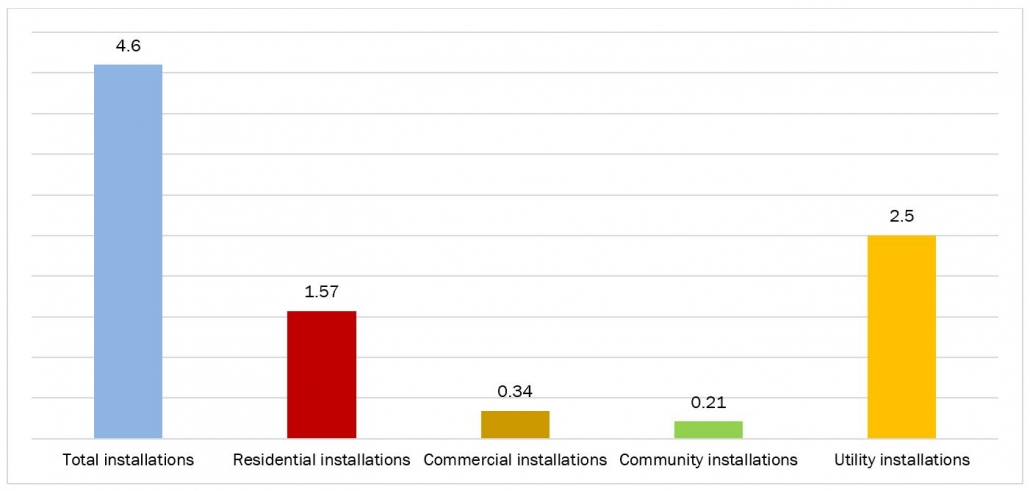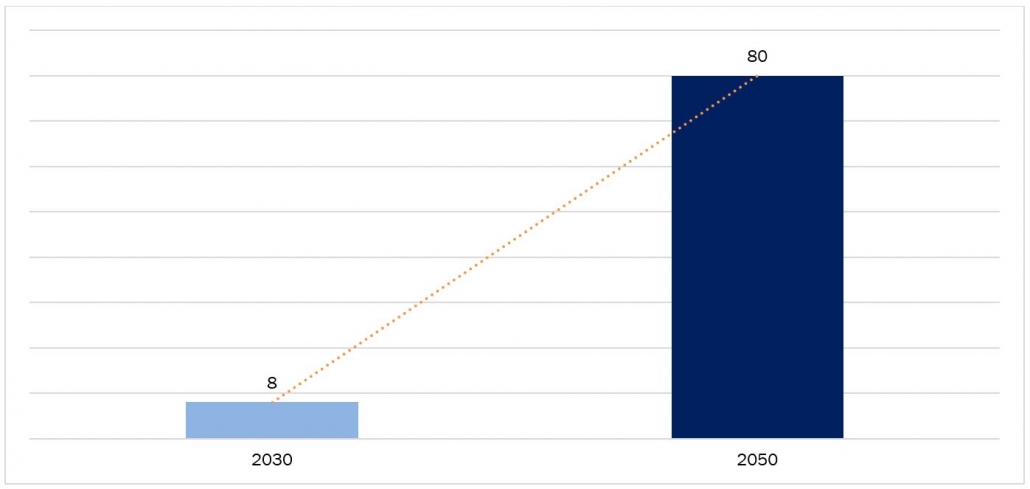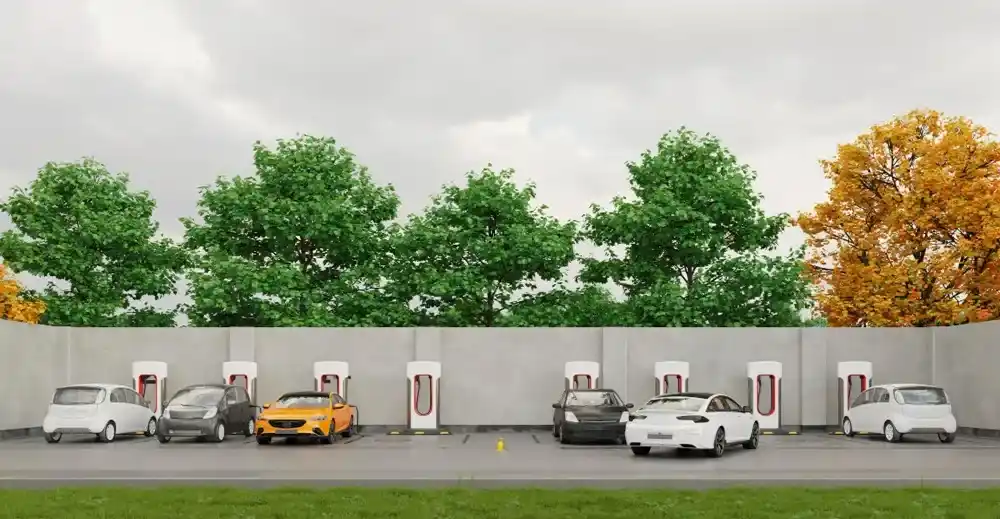Sustainable Solutions: Exploring the Growing Solar Panel Recycling Market

With the increasing global shift towards renewable energy sources, the solar energy industry has experienced unprecedented growth in recent years. As solar panels reach the end of their lifespan, proper disposal and recycling become paramount to minimize environmental impact and maximize resource efficiency. This article delves into the emerging market of solar panel recycling, exploring its significance, challenges, technological innovations, and prospects.
The solar panel industry has witnessed remarkable expansion worldwide, driven by factors such as declining costs, supportive government policies, and growing environmental awareness. As a result, the installation of solar energy systems has surged, leading to a corresponding increase in the number of decommissioned solar panels requiring proper disposal or recycling.
In the third quarter of 2022, the US solar market added 4.6 GWdc of solar capacity, marking a 17% drop from the same period in 2021 and a 2% decrease from the previous quarter. The industry remains constrained by supply issues, notably stemming from import detentions. Solar energy constituted 45% of all newly added electricity-generating capacity to the US grid during this quarter, surpassing other sources. Notably, the residential sector experienced a significant quarter, with 1.57 GWdc installed, reflecting a 43% increase from Q3 2021 and a 16% rise from Q2 2022. California accounted for 36% of this total, as installers aimed to capitalize on current net metering rates before potential changes.
Commercial solar installations reached 340 MWdc, up 3% compared to the previous year but down 10% from the previous quarter. Community solar installations amounted to 212 MWdc, down 17% both year-over-year and quarter-over-quarter. Utility-scale solar deployment stood at 2.5 GWdc in Q3 2022, registering a 36% decrease from the same period in 2021 and a 9% decrease from Q2 2022. These lower installation numbers are attributed to past project delays and ongoing supply chain challenges.
Figure 1: Increased Solar Energy Estimates for Q3 2022, in Gigawatt Direct Current
 Source: Solar Energy Industry Association
Solar power is a prominent renewable energy source in Australia, with rooftop solar photovoltaic (PV) systems installed in over 3.3 million households across the country.
While solar energy offers numerous environmental benefits, including reduced greenhouse gas emissions and dependence on fossil fuels, the disposal of end-of-life solar panels poses environmental challenges. Solar panels contain materials such as glass, aluminum, silicon, and various metals, along with small amounts of hazardous substances like lead and cadmium. Improper disposal can result in these toxic materials leaching into soil and waterways, posing risks to ecosystems and human health.
Recognizing the need for responsible management of solar panel waste, governments and regulatory bodies worldwide have implemented laws and regulations governing their disposal and recycling. These regulations aim to ensure the safe handling, treatment, and recycling of solar panels to minimize environmental contamination and promote resource recovery.
Advancements in solar panel recycling technologies have opened new avenues for efficient and cost-effective end-of-life management. Innovative processes, such as mechanical shredding, thermal treatment, and chemical extraction, allow for the recovery of valuable materials from decommissioned solar panels. For instance, silicon, aluminum, and silver can be reclaimed and reused in the manufacturing of new solar panels or other products.
The solar panel recycling market is poised for significant growth in the coming years, driven by the increasing volume of decommissioned solar panels and the growing emphasis on sustainability. Market trends indicate a rising demand for recycling services and solutions, creating opportunities for companies specializing in solar panel recycling and resource recovery. Projections suggest that the solar panel recycling market will continue to expand as awareness of environmental issues grows and regulatory requirements become more stringent.
According to a report from MIT released in August 2021, approximately 8 million metric tons of retired solar panels may accumulate worldwide by 2030. By 2050, this figure could escalate to 80 million metric tons. Recycling these panels presents an opportunity to obtain materials that would otherwise require mining, potentially under hazardous or exploitative labor conditions. This practice could enhance the sustainability of solar energy, contributing positively to the clean-energy landscape.
Figure 2: Estimates of Retired Solar Panels by 2030 and 2050, in Million Metric Tons
Source: Solar Energy Industry Association
Solar power is a prominent renewable energy source in Australia, with rooftop solar photovoltaic (PV) systems installed in over 3.3 million households across the country.
While solar energy offers numerous environmental benefits, including reduced greenhouse gas emissions and dependence on fossil fuels, the disposal of end-of-life solar panels poses environmental challenges. Solar panels contain materials such as glass, aluminum, silicon, and various metals, along with small amounts of hazardous substances like lead and cadmium. Improper disposal can result in these toxic materials leaching into soil and waterways, posing risks to ecosystems and human health.
Recognizing the need for responsible management of solar panel waste, governments and regulatory bodies worldwide have implemented laws and regulations governing their disposal and recycling. These regulations aim to ensure the safe handling, treatment, and recycling of solar panels to minimize environmental contamination and promote resource recovery.
Advancements in solar panel recycling technologies have opened new avenues for efficient and cost-effective end-of-life management. Innovative processes, such as mechanical shredding, thermal treatment, and chemical extraction, allow for the recovery of valuable materials from decommissioned solar panels. For instance, silicon, aluminum, and silver can be reclaimed and reused in the manufacturing of new solar panels or other products.
The solar panel recycling market is poised for significant growth in the coming years, driven by the increasing volume of decommissioned solar panels and the growing emphasis on sustainability. Market trends indicate a rising demand for recycling services and solutions, creating opportunities for companies specializing in solar panel recycling and resource recovery. Projections suggest that the solar panel recycling market will continue to expand as awareness of environmental issues grows and regulatory requirements become more stringent.
According to a report from MIT released in August 2021, approximately 8 million metric tons of retired solar panels may accumulate worldwide by 2030. By 2050, this figure could escalate to 80 million metric tons. Recycling these panels presents an opportunity to obtain materials that would otherwise require mining, potentially under hazardous or exploitative labor conditions. This practice could enhance the sustainability of solar energy, contributing positively to the clean-energy landscape.
Figure 2: Estimates of Retired Solar Panels by 2030 and 2050, in Million Metric Tons
 Source: MIT Technology Review
Several companies and organizations are at the forefront of solar panel recycling efforts, developing innovative technologies and initiatives to address the challenges associated with end-of-life solar panels. Leading players in the industry include recycling firms, equipment manufacturers, and research institutions. Collaborative initiatives between industry stakeholders, government agencies, and environmental organizations aim to promote best practices in solar panel recycling and drive sustainable solutions.
While the upfront costs of solar panel recycling may seem daunting, the economic benefits of resource recovery and environmental protection outweigh the expenses in the long run. Recycling solar panels allows for the recovery of valuable materials, reducing the need for virgin resources and lowering production costs for new solar panels. Additionally, recycling incentives, government subsidies, and extended producer responsibility programs can help offset recycling costs and encourage responsible end-of-life management.
Looking ahead, the solar panel recycling market is poised for continued growth and innovation. Technological advancements will drive improvements in recycling efficiency, resource recovery rates, and environmental sustainability. Regulatory frameworks will evolve to address emerging challenges and promote standardized practices across different regions. As solar energy continues to play a pivotal role in the transition to a sustainable energy future, the importance of responsible end-of-life management will only increase.
Key Developments
In December 2023, EDP Renewables North America, a renewable energy developer, owner, and operator, introduced a new initiative following its collaboration with Solarcycle, a solar power recycling company. The program aims to explore alternative applications for solar power equipment once it reaches the end of its operational lifespan.
In September 2023, Greenbacker Renewable Energy Company LLC, an independent power producer and prominent investment manager focused on climate initiatives, revealed an exclusive, enduring collaboration with SOLARCYCLE, a solar recycling company driven by technology. The partnership aims to ensure efficient and cost-effective recycling solutions for retired solar panels.
In July 2023, Marubeni Corporation and HAMADA Co., Ltd. joined forces to establish a fresh entity named "Rexia Corporation." This new company has commenced operations focused on offering services related to the reuse and recycling of used solar panels, encompassing activities such as buying, selling, and disposing of these panels.
On May 5, 2022, SOLARCYCLE, Inc officially announced the launch of its new technology-driven recycling platform aimed at maximizing solar sustainability. The company, headquartered in Northern California, was established by experts in solar energy, sustainability, and advanced recycling technologies - individuals who were pioneers in their respective fields from esteemed institutions such as Solaria, NEXTracker, Sierra Club, and the University of New South Wales. SOLARCYCLE aimed to become the preferred partner for solar asset owners seeking a comprehensive, cost-effective, and sustainable solution for their end-of-life system requirements. At its launch, SOLARCYCLE partnered with Sunrun (NASDAQ: RUN), the leading provider of home solar, battery storage, and energy services in the nation. Both companies shared a strong commitment to developing a solar industry that embraced a more sustainable, circular, and domestically sourced supply chain. SOLARCYCLE utilized second-life panels from Sunrun to explore and develop innovative methods for testing, reusing, and upcycling retired solar panels in Sunrun's project portfolio. This collaboration laid the groundwork for a scalable solution that would be made available to the entire industry by the end of the year.
In conclusion, the solar panel recycling market represents a vital component of the broader renewable energy landscape, ensuring that the environmental benefits of solar energy are maximized while minimizing its ecological footprint. With continued advancements in technology, regulation, and industry collaboration, the solar panel recycling market holds tremendous potential to drive positive environmental and economic outcomes, contributing to a more sustainable and resilient energy future for generations to come.
Find some of our related studies:
Source: MIT Technology Review
Several companies and organizations are at the forefront of solar panel recycling efforts, developing innovative technologies and initiatives to address the challenges associated with end-of-life solar panels. Leading players in the industry include recycling firms, equipment manufacturers, and research institutions. Collaborative initiatives between industry stakeholders, government agencies, and environmental organizations aim to promote best practices in solar panel recycling and drive sustainable solutions.
While the upfront costs of solar panel recycling may seem daunting, the economic benefits of resource recovery and environmental protection outweigh the expenses in the long run. Recycling solar panels allows for the recovery of valuable materials, reducing the need for virgin resources and lowering production costs for new solar panels. Additionally, recycling incentives, government subsidies, and extended producer responsibility programs can help offset recycling costs and encourage responsible end-of-life management.
Looking ahead, the solar panel recycling market is poised for continued growth and innovation. Technological advancements will drive improvements in recycling efficiency, resource recovery rates, and environmental sustainability. Regulatory frameworks will evolve to address emerging challenges and promote standardized practices across different regions. As solar energy continues to play a pivotal role in the transition to a sustainable energy future, the importance of responsible end-of-life management will only increase.
Key Developments
In December 2023, EDP Renewables North America, a renewable energy developer, owner, and operator, introduced a new initiative following its collaboration with Solarcycle, a solar power recycling company. The program aims to explore alternative applications for solar power equipment once it reaches the end of its operational lifespan.
In September 2023, Greenbacker Renewable Energy Company LLC, an independent power producer and prominent investment manager focused on climate initiatives, revealed an exclusive, enduring collaboration with SOLARCYCLE, a solar recycling company driven by technology. The partnership aims to ensure efficient and cost-effective recycling solutions for retired solar panels.
In July 2023, Marubeni Corporation and HAMADA Co., Ltd. joined forces to establish a fresh entity named "Rexia Corporation." This new company has commenced operations focused on offering services related to the reuse and recycling of used solar panels, encompassing activities such as buying, selling, and disposing of these panels.
On May 5, 2022, SOLARCYCLE, Inc officially announced the launch of its new technology-driven recycling platform aimed at maximizing solar sustainability. The company, headquartered in Northern California, was established by experts in solar energy, sustainability, and advanced recycling technologies - individuals who were pioneers in their respective fields from esteemed institutions such as Solaria, NEXTracker, Sierra Club, and the University of New South Wales. SOLARCYCLE aimed to become the preferred partner for solar asset owners seeking a comprehensive, cost-effective, and sustainable solution for their end-of-life system requirements. At its launch, SOLARCYCLE partnered with Sunrun (NASDAQ: RUN), the leading provider of home solar, battery storage, and energy services in the nation. Both companies shared a strong commitment to developing a solar industry that embraced a more sustainable, circular, and domestically sourced supply chain. SOLARCYCLE utilized second-life panels from Sunrun to explore and develop innovative methods for testing, reusing, and upcycling retired solar panels in Sunrun's project portfolio. This collaboration laid the groundwork for a scalable solution that would be made available to the entire industry by the end of the year.
In conclusion, the solar panel recycling market represents a vital component of the broader renewable energy landscape, ensuring that the environmental benefits of solar energy are maximized while minimizing its ecological footprint. With continued advancements in technology, regulation, and industry collaboration, the solar panel recycling market holds tremendous potential to drive positive environmental and economic outcomes, contributing to a more sustainable and resilient energy future for generations to come.
Find some of our related studies:
 Source: Solar Energy Industry Association
Solar power is a prominent renewable energy source in Australia, with rooftop solar photovoltaic (PV) systems installed in over 3.3 million households across the country.
While solar energy offers numerous environmental benefits, including reduced greenhouse gas emissions and dependence on fossil fuels, the disposal of end-of-life solar panels poses environmental challenges. Solar panels contain materials such as glass, aluminum, silicon, and various metals, along with small amounts of hazardous substances like lead and cadmium. Improper disposal can result in these toxic materials leaching into soil and waterways, posing risks to ecosystems and human health.
Recognizing the need for responsible management of solar panel waste, governments and regulatory bodies worldwide have implemented laws and regulations governing their disposal and recycling. These regulations aim to ensure the safe handling, treatment, and recycling of solar panels to minimize environmental contamination and promote resource recovery.
Advancements in solar panel recycling technologies have opened new avenues for efficient and cost-effective end-of-life management. Innovative processes, such as mechanical shredding, thermal treatment, and chemical extraction, allow for the recovery of valuable materials from decommissioned solar panels. For instance, silicon, aluminum, and silver can be reclaimed and reused in the manufacturing of new solar panels or other products.
The solar panel recycling market is poised for significant growth in the coming years, driven by the increasing volume of decommissioned solar panels and the growing emphasis on sustainability. Market trends indicate a rising demand for recycling services and solutions, creating opportunities for companies specializing in solar panel recycling and resource recovery. Projections suggest that the solar panel recycling market will continue to expand as awareness of environmental issues grows and regulatory requirements become more stringent.
According to a report from MIT released in August 2021, approximately 8 million metric tons of retired solar panels may accumulate worldwide by 2030. By 2050, this figure could escalate to 80 million metric tons. Recycling these panels presents an opportunity to obtain materials that would otherwise require mining, potentially under hazardous or exploitative labor conditions. This practice could enhance the sustainability of solar energy, contributing positively to the clean-energy landscape.
Figure 2: Estimates of Retired Solar Panels by 2030 and 2050, in Million Metric Tons
Source: Solar Energy Industry Association
Solar power is a prominent renewable energy source in Australia, with rooftop solar photovoltaic (PV) systems installed in over 3.3 million households across the country.
While solar energy offers numerous environmental benefits, including reduced greenhouse gas emissions and dependence on fossil fuels, the disposal of end-of-life solar panels poses environmental challenges. Solar panels contain materials such as glass, aluminum, silicon, and various metals, along with small amounts of hazardous substances like lead and cadmium. Improper disposal can result in these toxic materials leaching into soil and waterways, posing risks to ecosystems and human health.
Recognizing the need for responsible management of solar panel waste, governments and regulatory bodies worldwide have implemented laws and regulations governing their disposal and recycling. These regulations aim to ensure the safe handling, treatment, and recycling of solar panels to minimize environmental contamination and promote resource recovery.
Advancements in solar panel recycling technologies have opened new avenues for efficient and cost-effective end-of-life management. Innovative processes, such as mechanical shredding, thermal treatment, and chemical extraction, allow for the recovery of valuable materials from decommissioned solar panels. For instance, silicon, aluminum, and silver can be reclaimed and reused in the manufacturing of new solar panels or other products.
The solar panel recycling market is poised for significant growth in the coming years, driven by the increasing volume of decommissioned solar panels and the growing emphasis on sustainability. Market trends indicate a rising demand for recycling services and solutions, creating opportunities for companies specializing in solar panel recycling and resource recovery. Projections suggest that the solar panel recycling market will continue to expand as awareness of environmental issues grows and regulatory requirements become more stringent.
According to a report from MIT released in August 2021, approximately 8 million metric tons of retired solar panels may accumulate worldwide by 2030. By 2050, this figure could escalate to 80 million metric tons. Recycling these panels presents an opportunity to obtain materials that would otherwise require mining, potentially under hazardous or exploitative labor conditions. This practice could enhance the sustainability of solar energy, contributing positively to the clean-energy landscape.
Figure 2: Estimates of Retired Solar Panels by 2030 and 2050, in Million Metric Tons
 Source: MIT Technology Review
Several companies and organizations are at the forefront of solar panel recycling efforts, developing innovative technologies and initiatives to address the challenges associated with end-of-life solar panels. Leading players in the industry include recycling firms, equipment manufacturers, and research institutions. Collaborative initiatives between industry stakeholders, government agencies, and environmental organizations aim to promote best practices in solar panel recycling and drive sustainable solutions.
While the upfront costs of solar panel recycling may seem daunting, the economic benefits of resource recovery and environmental protection outweigh the expenses in the long run. Recycling solar panels allows for the recovery of valuable materials, reducing the need for virgin resources and lowering production costs for new solar panels. Additionally, recycling incentives, government subsidies, and extended producer responsibility programs can help offset recycling costs and encourage responsible end-of-life management.
Looking ahead, the solar panel recycling market is poised for continued growth and innovation. Technological advancements will drive improvements in recycling efficiency, resource recovery rates, and environmental sustainability. Regulatory frameworks will evolve to address emerging challenges and promote standardized practices across different regions. As solar energy continues to play a pivotal role in the transition to a sustainable energy future, the importance of responsible end-of-life management will only increase.
Key Developments
In December 2023, EDP Renewables North America, a renewable energy developer, owner, and operator, introduced a new initiative following its collaboration with Solarcycle, a solar power recycling company. The program aims to explore alternative applications for solar power equipment once it reaches the end of its operational lifespan.
In September 2023, Greenbacker Renewable Energy Company LLC, an independent power producer and prominent investment manager focused on climate initiatives, revealed an exclusive, enduring collaboration with SOLARCYCLE, a solar recycling company driven by technology. The partnership aims to ensure efficient and cost-effective recycling solutions for retired solar panels.
In July 2023, Marubeni Corporation and HAMADA Co., Ltd. joined forces to establish a fresh entity named "Rexia Corporation." This new company has commenced operations focused on offering services related to the reuse and recycling of used solar panels, encompassing activities such as buying, selling, and disposing of these panels.
On May 5, 2022, SOLARCYCLE, Inc officially announced the launch of its new technology-driven recycling platform aimed at maximizing solar sustainability. The company, headquartered in Northern California, was established by experts in solar energy, sustainability, and advanced recycling technologies - individuals who were pioneers in their respective fields from esteemed institutions such as Solaria, NEXTracker, Sierra Club, and the University of New South Wales. SOLARCYCLE aimed to become the preferred partner for solar asset owners seeking a comprehensive, cost-effective, and sustainable solution for their end-of-life system requirements. At its launch, SOLARCYCLE partnered with Sunrun (NASDAQ: RUN), the leading provider of home solar, battery storage, and energy services in the nation. Both companies shared a strong commitment to developing a solar industry that embraced a more sustainable, circular, and domestically sourced supply chain. SOLARCYCLE utilized second-life panels from Sunrun to explore and develop innovative methods for testing, reusing, and upcycling retired solar panels in Sunrun's project portfolio. This collaboration laid the groundwork for a scalable solution that would be made available to the entire industry by the end of the year.
In conclusion, the solar panel recycling market represents a vital component of the broader renewable energy landscape, ensuring that the environmental benefits of solar energy are maximized while minimizing its ecological footprint. With continued advancements in technology, regulation, and industry collaboration, the solar panel recycling market holds tremendous potential to drive positive environmental and economic outcomes, contributing to a more sustainable and resilient energy future for generations to come.
Find some of our related studies:
Source: MIT Technology Review
Several companies and organizations are at the forefront of solar panel recycling efforts, developing innovative technologies and initiatives to address the challenges associated with end-of-life solar panels. Leading players in the industry include recycling firms, equipment manufacturers, and research institutions. Collaborative initiatives between industry stakeholders, government agencies, and environmental organizations aim to promote best practices in solar panel recycling and drive sustainable solutions.
While the upfront costs of solar panel recycling may seem daunting, the economic benefits of resource recovery and environmental protection outweigh the expenses in the long run. Recycling solar panels allows for the recovery of valuable materials, reducing the need for virgin resources and lowering production costs for new solar panels. Additionally, recycling incentives, government subsidies, and extended producer responsibility programs can help offset recycling costs and encourage responsible end-of-life management.
Looking ahead, the solar panel recycling market is poised for continued growth and innovation. Technological advancements will drive improvements in recycling efficiency, resource recovery rates, and environmental sustainability. Regulatory frameworks will evolve to address emerging challenges and promote standardized practices across different regions. As solar energy continues to play a pivotal role in the transition to a sustainable energy future, the importance of responsible end-of-life management will only increase.
Key Developments
In December 2023, EDP Renewables North America, a renewable energy developer, owner, and operator, introduced a new initiative following its collaboration with Solarcycle, a solar power recycling company. The program aims to explore alternative applications for solar power equipment once it reaches the end of its operational lifespan.
In September 2023, Greenbacker Renewable Energy Company LLC, an independent power producer and prominent investment manager focused on climate initiatives, revealed an exclusive, enduring collaboration with SOLARCYCLE, a solar recycling company driven by technology. The partnership aims to ensure efficient and cost-effective recycling solutions for retired solar panels.
In July 2023, Marubeni Corporation and HAMADA Co., Ltd. joined forces to establish a fresh entity named "Rexia Corporation." This new company has commenced operations focused on offering services related to the reuse and recycling of used solar panels, encompassing activities such as buying, selling, and disposing of these panels.
On May 5, 2022, SOLARCYCLE, Inc officially announced the launch of its new technology-driven recycling platform aimed at maximizing solar sustainability. The company, headquartered in Northern California, was established by experts in solar energy, sustainability, and advanced recycling technologies - individuals who were pioneers in their respective fields from esteemed institutions such as Solaria, NEXTracker, Sierra Club, and the University of New South Wales. SOLARCYCLE aimed to become the preferred partner for solar asset owners seeking a comprehensive, cost-effective, and sustainable solution for their end-of-life system requirements. At its launch, SOLARCYCLE partnered with Sunrun (NASDAQ: RUN), the leading provider of home solar, battery storage, and energy services in the nation. Both companies shared a strong commitment to developing a solar industry that embraced a more sustainable, circular, and domestically sourced supply chain. SOLARCYCLE utilized second-life panels from Sunrun to explore and develop innovative methods for testing, reusing, and upcycling retired solar panels in Sunrun's project portfolio. This collaboration laid the groundwork for a scalable solution that would be made available to the entire industry by the end of the year.
In conclusion, the solar panel recycling market represents a vital component of the broader renewable energy landscape, ensuring that the environmental benefits of solar energy are maximized while minimizing its ecological footprint. With continued advancements in technology, regulation, and industry collaboration, the solar panel recycling market holds tremendous potential to drive positive environmental and economic outcomes, contributing to a more sustainable and resilient energy future for generations to come.
Find some of our related studies:
- Floating Solar Panels Market: https://www.knowledge-sourcing.com/report/floating-solar-panels-market
- Monocrystalline Solar Panel Market: https://www.knowledge-sourcing.com/report/monocrystalline-solar-panel-market
- Organic Solar Cells Market: https://www.knowledge-sourcing.com/report/organic-solar-cells-market
Get in Touch
Interested in this topic? Contact our analysts for more details.
Latest Thought Articles

Top OSAT Companies Driving Semiconductor Assembly and Test Services Worldwide
Recently
EV Charging Stations Market Outlook: Smart Charging, Fast Charging, and Regional Expansion
Recently
Future of Corporate Wellness: Global Trends and Regional Outlook
Recently
Regional Breakdown of the Mechanical Keyboard Market: Who Leads and Why?
Recently